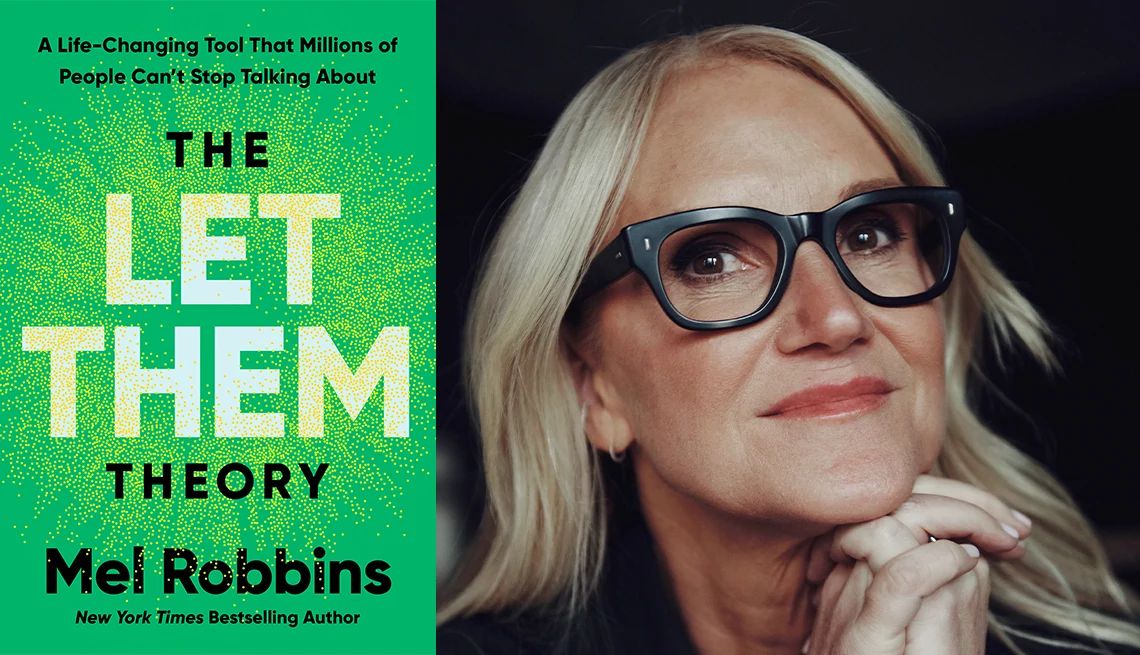AARP Hearing Center


A year or so ago, Mel Robbins, 56, was undoubtedly well-known: She helmed the wildly popular Mel Robbins Podcast and had written two popular self-help books, The 5 Second Rule: The Fastest Way to Change Your Life (2017) and The High 5 Habit: Take Control of Your Life With One Simple Habit (2021). But now? Her fame is next-level. Her new book, The Let Them Theory: A Life-Changing Tool That Millions of People Can’t Stop Talking About, has been perched at or near the top of the bestseller lists since its late-December release. Meanwhile, the podcast she launched in 2022 is among the top five podcasts in the country. She has 8.2 million Instagram followers, and fans are tattooing “Let them” on their bodies. She’s preparing a high-energy tour launching in May with shows in Boston, Chicago, London, Toronto and New York City. “It will feel like the best motivational experience and laugh-out-loud stand-up routine you’ve ever seen,” she tells AARP, with the frank self-confidence essential to her brand.
Part of Robbins’s appeal, though, is her down-to-earth, I’m-just-like-you vibe: She often emphasizes her flaws and mistakes, repeating her story about a particularly low point in her life, around 2008, when she and her husband, Chris, were at the brink of bankruptcy and divorce after a failed business venture, and she was struggling with anxiety and alcoholism. But — thanks to the tools she discovered and subsequently shared in her books and podcast — she took control of her self-destructive behavior, saved her marriage and discovered her gift for motivational speaking. That became clear when her 2011 TEDx talk, “How to Stop Screwing Yourself Over,” went viral (it’s received more than 33 million views). It featured her “five-second rule,” which essentially advises counting backward from five to one, rocketship-launch-style, and taking action before you can talk yourself out of doing so.
The idea outlined in The Let Them Theory, which Oprah (yes, Oprah!) described as “one of the best self-help books I’ve ever read,” famously took root when Robbins was helping her son Oakley get ready for his prom. She found herself growing agitated because he didn’t want to take a corsage she’d ordered for his date, then more so when she realized he and his friends didn’t have dinner reservations. Her daughter, observing the scene, grew frustrated and said, “Mom, if Oakley and his friends want to go to a taco bar for pre-prom, LET THEM… It’s their prom. Not yours. Just drop it.”
That led Robbins to a revelation: It’s counterproductive to focus on managing other people’s lives, moods, opinions and actions. So, letting go — letting them — will make you a happier, more productive person. A key next step, though, is to then say, “Let me,” and take action to pursue what really matters. “The problem isn’t you,” Robbins writes. “The problem is the power you unknowingly give other people.”
Her ideas might sound simple, even simplistic, but that’s what people seem to love about them.
Robbins, who was raised in western Michigan, lives in Vermont with her husband, Chris (the last of their three children left for college last fall). She talked to AARP recently about her popularity, why she thinks her theory works, what she does for kicks and more.
Here are some highlights from the interview, which has been edited for space and clarity:
Why do you think so many people have embraced this “let them” concept?
I think there are three reasons. Number one is the fact that it’s simple and works immediately and universally. You read a headline, and it stresses you out, and you say, “Let them,” and you immediately feel different. That’s one reason. The second reason is that you immediately know it’s true. Whether you’re a fan of stoicism or Buddhism, or you love the Serenity Prayer, or you understand radical acceptance or detachment theory — the Let Them Theory is part of this eternal legacy of wisdom and of philosophy and of spiritual teachings, only it’s now a modern, simple tool that is relevant to life right now.
And the third reason is that, ultimately, this book is about freedom and power and control, and this very, very simple message is hitting at a moment in modern history where the average person feels more stressed out, more overwhelmed, more uncertain about the future. And this is a tool — it’s not something intellectual or complicated — it’s a tool that helps you understand in an instant what is in your control and what is not in your control.


How does it help you, personally?
I’m just like everybody else. I read the headlines, I feel overwhelmed, stressed out, and discouraged. I’ve got parents who are aging and I’m worried about. I’ve got adult kids, and I’m worried about them too. What has been very helpful to me is understanding that there are always going to be things in life that are out of your control, and that’s not where your power is. So when you’re saying, “Let them,” you’re saying to yourself, “I recognize that my parents getting older is out of my control. And I also recognize that anytime I try to control something that I can’t control, namely other people, I’m just going to cause stress for myself. So I’m going to say, ‘Let them.’”
Can you explain the second part of your theory?
After I say, “Let them,” I say, "Let me." Let me remind myself that there are always three things I can control. I can control what I think about this. I can control what I do or don’t do, and I can control how I react to my emotions. If I focus on these three things, I know, through my attitude and my actions, I can make things a little better.




































































You Might Also Like
An Interview With 'James' Author, Percival Everett
He tells AARP about his National Book Award-winning novel, favorite authors, and the writing life
Deepak Chopra Brings One Woman’s Manifesting Journey Full Circle
The self-help guru reveals a simple meditative secret to finding happiness
10 Fantastic Short Story Collections for Your Book Club
No time to read a long novel? A good story can give your group plenty to talk about